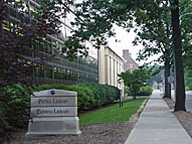Center for Neural Engineering Home
Fund. Neural Eng. Interfaces
Neural Engineering: Fundamentals of Interfacing with Brain (3) Biophysical basis of neural function, measurable signals, and neural stimulation; fundamentals of hardware-brain interfaces; survey of modern applications. Fall 2008: ESC597D
Neural Control Engineering
Neural Control Engineering (3) Principles of nonlinear Kalman filtering for state estimation and controlof neural systems including single neurons, networks, cortex, Parkinson's disease
Brain Computer Interfaces
Brain Computer Interfaces (BCI): Translate Thought into Action (3) Extensive advances have been made within the last decade to translate measurements of brain activity for prosthetic output. This course, targeted to engineering and science students, will introduce this field through hands-on experiments and design projects. We will cover an introduction to electroenephalogram (EEG) recording and interpretation, applied signal processing, discrimination and classification, and control programming. Students will apply these tools to implement their own BCI projects. This is a laboratory class, with groups of students working to record and analyze each other’s EEG.
NeuroEthics and NeuroLaw
NeuroEthics and NeuroLaw (1) (Colisted with STS597A) This course explores the ethical and legal implications of recent developments in neuroscience, and their current and potential ap-plications. Topics will include the use of brain imaging for lie de-tection and counterterrorism, deep brain stimulation, cognitive en-hancement and the implications of recent work in neuroscience for questions of morality, criminal responsibility and conscious-ness (including the potential rehabilitation of patients long-assumed to have been in permanent vegetative states). This is an interdisciplinary class for graduate students from philosophy, psy-chology and neuroscience (among others) as well as law students. The course is a 1 credit half-semester course. However, 2 addi-tional credits of independent study will also be offered to students who wish to write a research paper on a relevant topic with the agreement of the instructor and the student’s home department.
Seminar and Journal Club Courses
Weekly seminar courses/meetings to review current literature in integrated systems neural engineering. Topics vary with to participants interests and current publications. Available for participation and/or graduate course credit. Each meeting, one participant presents a pre-determined article for which the group has prepared, and the group discusses the findings, context and background.
1 hour Graduate Credit is based on:
- 25% participation (regularly prepared by reading papers and participates in discussion)
- 35% short write ups (7 times, prepare ~1 page summary of paper and discussion on papers they did not present)
- 40% presentation – prepare and present 2 articles
INTG SYS NEUR ENGR JC
Integrated Systems Neural Engineering (1) Seminar to review current literature in integrated systems neural engineering. Topics vary with to participants interests and current publications, but may include topics in signal processing, models and theory of seizure dynamics, experiments to understand neural activity during behavior and processing, instrumentation and materials for interfacing with brain.
Brain Computer Interfaces (BCI) Journal Club
Brain Computer Interface JC (1) Seminar Course to review current literature in Brain Computer Interfaces. Topics vary with participants' interests and current publications, but can include both invasive and non-invasive (EEG) based BCIs, signal processing and control theory, etc. Recent literature in BCI will be reviewed and research ideas will be generated through presentations and discussion.
Cellular Neural Engineering JC
Cellular Neural Engineering (1) Seminar to review current literature in Cellular and Network Neuroscience. Topics vary with participants' interests and current publications, but can include cellular network measurements and computational modeling, measurement technology including electrical, optical, and fluorescent imaging, etc.
NeuroMechanics JC
NeuroMechanics (1) Discussion of current literature on the mechanics and structure of brain with a special emphasis on modeling deformation, diffusion, and electromagnetics.
Advanced Neural Control Eng
Advanced Neural Control Eng (1)Advanced Topics in Neural Control Engineering (1) Intersection of control theory w/neuroscience.



